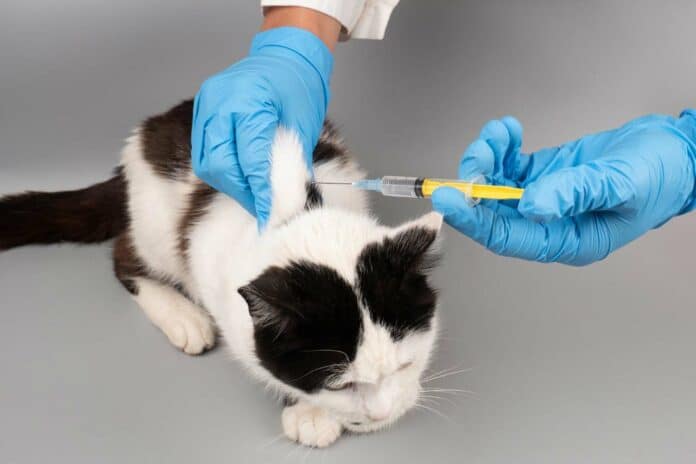Texas A&M University School of Public Health’s research on pet vaccination attitudes and their possible connection to human vaccine hesitancy is detailed in a recent study in Vaccine. Dr. Simon Haeder, an associate professor, analyzed data from a survey of over 2,000 dog and 1,400 cat owners in August 2023. The study assessed pet vaccination rates, perceptions of vaccines, and support for pet vaccination requirements.
Dr. Haeder highlighted the challenges posed by declining pet vaccination rates, leading to increased pet diseases and deaths, elevated human exposures, potential pathogen adaptations, and adverse effects on veterinarians. Pet owners’ emotional and financial health is also affected as many view their pets as family members.
The survey focused on pet owners, asking if they had dogs, cats, or both. Dog and cat owners were then questioned about their pets’ vaccination status for diseases like rabies, canine parvovirus, and feline panleukopenia. Respondents indicated their support for vaccination requirements for each disease and shared their views on vaccine safety, efficacy, and importance.
The survey also explored respondents’ trust in scientists, opinions on human vaccination mandates for children, political ideology, religiosity, non-veterinary expenses, and the frequency of dogs‘ exposure to others. Most vaccinated their pets against rabies, with slightly lower uptake for other core vaccines and some hesitancy towards non-core vaccines. Core vaccines are recommended for all pets, while non-core vaccines are optional.
The study discovered that people’s views on how necessary, effective, and safe vaccines are can predict their hesitancy toward getting vaccines. These opinions are also linked to their stance on vaccination requirements. The analysis revealed that pet owners without additional expenses, like boarding or training fees, tend to be more hesitant about vaccines. Interestingly, political beliefs influence pet vaccination attitudes less than human vaccines.
The study’s findings highlight a high confidence level in vaccine safety, efficacy, and importance for humans and pets. It also indicates a connection between vaccine hesitancy in humans and animals, with support for animal vaccine requirements strongly tied to similar conditions for humans. This suggests potential spillover effects and emphasizes the need for continued research and public health efforts on vaccine hesitancy in humans and animals.
Haeder said, “Concerns about growing hesitancy remain and should be taken seriously, for both pets and humans, before the United States falls below important thresholds to prevent major outbreaks of vaccine-preventable diseases.”
In conclusion, the study provided valuable insights into the complex dynamics of vaccine hesitancy, emphasizing the need for continued research and public health efforts to address hesitancy in both human and animal populations.
Journal reference:
- Simon F. Haeder, Assessing vaccine hesitancy and support for vaccination requirements for pets and potential Spillovers from humans. Vaccine. DOI: 10.1016/j.vaccine.2023.10.061.
